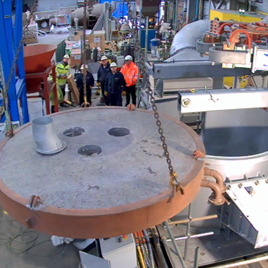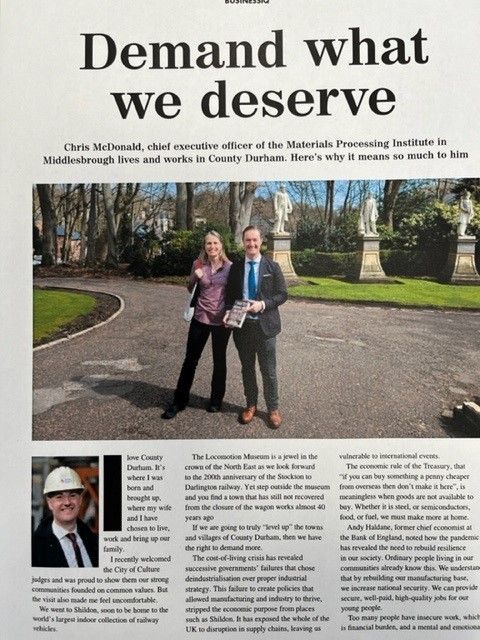New Electric Arc Furnace Installation - Update No.7
20 February 2026



Here is Chris McDonald's article published in the Summer edition of Business IQ
Business IQ is published by The Northern Echo.
I love County Durham. It’s where I was born and brought up, where my wife and I have chosen to live, work and bring up our family.
I recently welcomed the City of Culture judges and was proud to show them our strong communities founded on common values. But the visit also made me feel uncomfortable.
We went to Shildon, soon to be home to the world’s largest indoor collection of railway vehicles. The Locomotion Museum is a jewel in the crown of the North East as we look forward to the 200th anniversary of the Stockton to Darlington railway. Yet step outside the museum and you find a town that has still not recovered from the closure of the wagon works almost 40years ago.
If we are going to truly “level up” the towns and villages of County Durham, then we have the right to demand more.
The cost-of-living crisis has revealed successive governments’ failures that chose deindustrialisation over proper industrial strategy. This failure to create policies that allowed manufacturing and industry to thrive, stripped the economic purpose from places such as Shildon. It has exposed the whole of the UK to disruption in supply chains, leaving us vulnerable to international events.
The economic rule of the Treasury, that “if you can buy something a penny cheaper from overseas then don’t make it here”, is meaningless when goods are not available to buy. Whether it is steel, or semiconductors, food, or fuel, we must make more at home.
Andy Haldane, former chief economist at the Bank of England, noted how the pandemic has revealed the need to rebuild resilience in our society. Ordinary people living in our communities already know this. We understand that by rebuilding our manufacturing base, we increase national security. We can provide secure, well-paid, high-quality jobs for our young people.
Too many people have insecure work, which is financial burden, and a mental and emotional burden too. Growing up in a family that experienced worklessness during the recession of the early 1990s, I know what it is like to experience this. I also know that no matter how secure, or successful you later become, the sense of precariousness and the fear of everything falling away, never leaves you.
We need to move away from an economy based on wealth extraction. For decades, the wealth generated by the toil of Durham miners and steelworkers was not reinvested here. We need an economy based on creating wealth that stays in our communities.
A relentless focus on financial gain, has shown us the grotesque spectacle of PPE profiteering during the pandemic. It has brought about a new generation of Robber Barons running largely unregulated, monopoly providers of digital platforms, harvesting our personal data.
The result is much greater inequality, between regions, between generations and between towns and cities. This is the wrong kind of growth. We must focus instead on fair growth and better living standards for everyone.
The Industrial Strategy Commission has called for Universal Basic Infrastructure, guaranteeing that everyone “everywhere in the UK [is] served with high quality hard infrastructure and [has] access to high quality... universal services”. Services such as universities, FE colleges and hospitals, sitting alongside more productive firms that build capacity, innovation, and productivity in their supply chains.
This is a good start, but on its own it will not be enough to strengthen our communities. We need to pay attention the “everyday economy”. We need to move beyond a focus on hi-tech sectors, which are important, but will only employ a small number of highly qualified people. We need to focus on how we can improve work, wages, and productivity in sectors like retail, or health and social care, which employ a lot of people, but too often pay low wages. These are workers who typically have been underpaid and unprotected but showed how vital they are to society when the pandemic struck.
The problems of Shildon are replicated elsewhere in County Durham. Take Consett, once one of the world’s greatest steel towns. Despite the changes of recent decades, it still faces challenges. Is the state of the town centre acceptable? Are vital bus connections affordable and reliable? Is it enough to be a dormitory town for Newcastle? If the answer to these questions is “no”, then we need to rethink our economic policies.
We need to emphasise industry, decent jobs, and high quality local services. We need, to create the right conditions to allow our young people to achieve their potential.
By investing in the economy of our local communities we can give young people the chance to live and work in their home town and attract new people to want to move here too.
This is the focus of my work at the Redhills charity in Durham, where I recently met with Fiona Hill. Fiona started life in Bishop Auckland before moving to the United States for her academic studies and then went on to become National Security Adviser to three American Presidents. How many more Fiona Hills are born in places such as Bishop Auckland, Burnhope, or Blackhill, but who don’t have the opportunity to succeed.
A true measure of levelling up is one where your life chances are not determined by the place of your birth.
My blueprint for levelling up in County Durham starts with putting money and power directly back into the hands of local people. With a commitment to universal basic infrastructure and a national industrial strategy focussed on rebuilding manufacturing, we can reinvigorate our local communities with a sense of economic purpose. Alongside this, we must support the everyday economy that towns and villages need to thrive and create the opportunities for our young people to realise their potential.
We must empower communities to level up themselves, rather than be levelled up by others. County Durham’s greatest asset is its communities and their spirit. It is on this that we should build.
26 July 2022